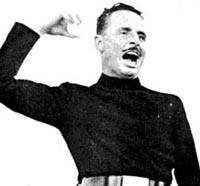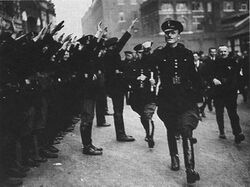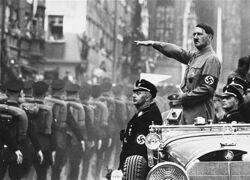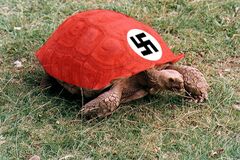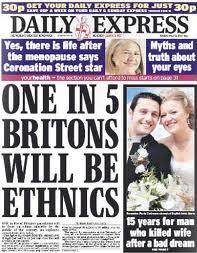Oswald Mosley
Sir Oswald Ernald Mosley (16 November 1896 – 3 December 1980) was a well-groomed British comedian who rose to fame during the popularity of 1920s and 1930s fascist movement, which challenged both conventional comedy as well as being a reaction against the "politically correct" material of the socialists and communists. Mosley became famous for his stand-up shows and later radio shows, and could be seen screaming his head off up and down the British Isles for many years, until he dropped dead of course.
Early life[edit]
Mosley was born in London, England to aristocrats. His childhood years were spent associating with other children from various ethnic backgrounds or "natural inferiors" as little Oswald was taught to call them. Oswald enjoyed playing games such as "Squarebashing" and "Who can goosestep the highest?". Local people found him cute and charming, but then they said the same about Caligula when he was a nipper.
World War I[edit]
Mosley joined the British Army in 1914 and saw a great deal of action at the rear in France. He also fought in the war. After the end of hostilities in 1918 he left the army, disillusioned with how peaceful it had become and looked for an alternative way to make a living.
Parliament[edit]
Young Oswald stood for parliament, initially winning a seat as a Conservative (which came with a free knighthood) in 1920 he became disillusioned with postwar tory policies and defected to Labour in 1921. He got sick of them too and defected to the Liberals in 1923 but found them a bit wet, really and defected to the German-Takeover Now! Party later that year who were subsequently banned following the passing of the 1923 Obvious Foreign Agents In Parliament Act, losing him his seat and his income.
Standup[edit]
Having had little success standing for Parliament, Mosley decided to try a different kind of stand-up. Starting in 1924, he began touring both exclusive gentlemen's clubs and working mens' pubs with his right-wing comedy act. Billed as Ooh, Oswald, You Are Awful!, his routine centred around the satirical, almost offensive characters he created, such as Chalkie the Commie, Terrence the Tory, and Shlomo Shekelstein.
Mosley was popular with certain English audiences who claimed he was merely "telling it like it is", but caused extreme animosity from others, especially the humourless liberals and thin-skinned minorities he mocked on-stage. As a result, riots often broke out between Mosley's fans (dubbed "blackshirts", on account of the outfits they wore to reduce stains from all the beer and spit thrown their way) and his haters (dubbed "International Bolshevism" by Mosley) at Royal Albert Hall shows.
Relationship with Mussolini[edit]
Controversy occurred in 1928 when Benito Mussolini, the Italian stand-up tyrant, accused Mosley of "stealing [his] material". However, Mosley merely claimed to be paying tribute to the Futurist Manifesto which he also claimed Mussolini had based much of his act on. Mosley criticised Mussolini's popular show Fascist Manifesto accusing it of being a "sell out", claiming that Mussolini had "gone mainstream" and shocked the short, fat Italian by suggesting he "go back to the Socialists". However, once Mussolini actually implemented his policies Mosley admitted he had been wrong in his regular column in the Daily Express stating "Mr Mussolini's material is actually deeply subversive, under the guise of giving the Italian people something mainstream and comfortable, he has actually made them enjoy pro-war and pro-imperialist material."
British Union of Fascists[edit]
Eventually, Mosley started referring to his shows as "rallies" and in 1930 organised his supporters into a new political party, the British Union of Facists. This new party pledged to "revitalise" Britain and the British Empire through a policy of dressing in black jumpsuits, wearing peaked caps at a silly angle, and beating up Jews and socialists. The latter policy eventually lead to a big streetbrawl called "The Battle Of Cable Street" against bearded communists and Jews (also bearded) which Mosley (moustache only) and his Blackshirts (clean shaven) lost.
This was intensely embarrasing for the BUoFB as fascists took pride in the notion that they always won battles and if they were going to lose it certainly wouldn't be to a gaggle of Guardian readers. Showing the "can do" spirit of fascism, Mosley continued to hold rallies although his fanbase was starting to shrink and he was forced to play pubs and working mens' clubs rather than the stadiums he'd used to. In 1939, with the declaration of war against Nazi Germany, there were concerns in Whitehall about Mosley. A senior civil servant wrote to Neville Chamberlain declaring:
"I know Sir Oswald's a bit of a lark, and I know you like his early standup stuff but frankly this later stuff isn't just unfunny, it's quite possibly pro-German. I suggest we have him locked up. He was better on the radio too."
Chamberlain's government agreed and Oswald was duly imprisoned along with his fans under the emergency "Possible Traitors" powers. This wasn't a violation of their human rights, though, because they were fascists.
After World War II[edit]
Following the war, Mosley and his fans were released and he returned to standup. During the early 1940s, he played several benefit gigs for the "Send 'Em Home" movement (later the UK Independence Party), where he brought back some old favourites as well as introducing new characters such as the Porch Monkey and Chaim Goldstein. He also revitalised his radio career in the 1950s, appearing regularly on Tony Hancock's famous sitcom Hancock's Half Hour playing angry neighbour "Mr Nazi". Hancock had Mosley's character dropped before the move to TV although this was apparently "nothing personal" since Hancock did that with everyone.
In the early 1970s, Mosley appeared several times on the Radio 4 panel gameshow Just A Minute but was eventually banned after constantly deviating from the subject to the "international jew-negro-marxist conspiracy" within ten seconds, castigating Clement Freud as "a filthy liberal pulling the strings of this show and the country!" and trying to have "mincing deviant" Kenneth Williams shot.
Later life and death[edit]
Towards the end of his life, Mosley became a regular on talk shows and, in the 1970s, continued to make money as a "warm-up man" for Conservative Party conferences following Margaret Thatcher's rise to Conservative leader.
Mosley died in 1980 whilst having a tribute song, "Good Old Oswald Mosley", sung at him by Mel Smith on Not the Nine O'Clock News. (lyrics shown below) The smell of Mel's digesting BBC canteen dinner which inevitably blasted towards him during this performance was too much for the old fascist's heart.
| “ | "Good Old Oswald Mosley" written by Peter Brewis sung by Margaret Thatcher, Pamela Stephenson, Mel Smith, and Griff Rhys Jones They didn’t understand ‘im, some people called ‘im mad He was popular and handsome as Richard Burton He could have been a great dictator given ‘alf a chance |
” |
Legacy[edit]
Sir Oswald Mosley's contribution to the world of far-right politics and standup comedy remains influential. He has been claimed as an inspiration by Jim Davidson, Nick Griffin and Hezbolaughs (the comedy wing of Hezbollah). Mahmoud Ahmadinejad has also been quoted as being "a big fan of the English zionist-hater" and is pushing for the release of a box-set of Mosley's early routines and radio shows. He also leaves behind a son; Max Mosley who also happens to be the current president of the FIA, another far-right, authoritarian organisation allied to Italy. Mosley Jr is said to base his running of the organization on a business model developed by his late Father. Nigel Farrago of UKIP has also praised Mosley as "a fine libertarian".
Whilst Mosley's "subversive" and "dark" comedy was frowned-upon in the postwar years and the "right-on" eighties and nineties it has increasingly come back into fashion and, although modern practitioners of his particular brand of "alternative" are reluctant to pay open tribute to pioneers like Mosley his influence can be seen in modern publications such as the Daily Express and in the columns of Richard Littlejohn, Katie Hopkins and "Mad" Melanie Philips. Unpopular gobshite Jon Gaunt's podcasts, recorded for very little money in his bedroom in his underpants, have also been described as a "21st Century version" of Mosley's old radio shows "with the obvious exception that nobody listens to them".
